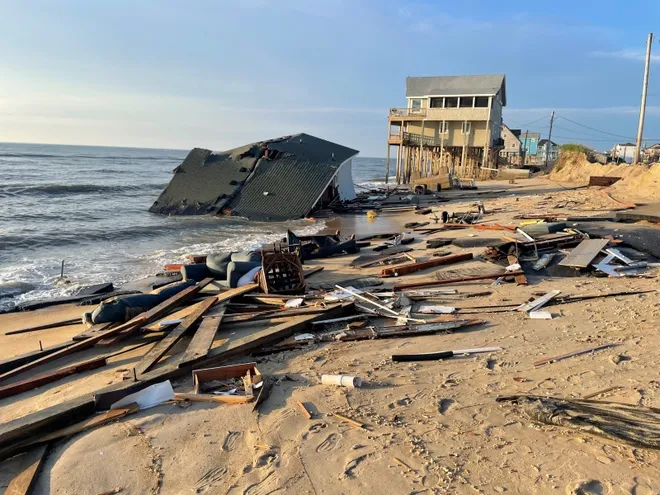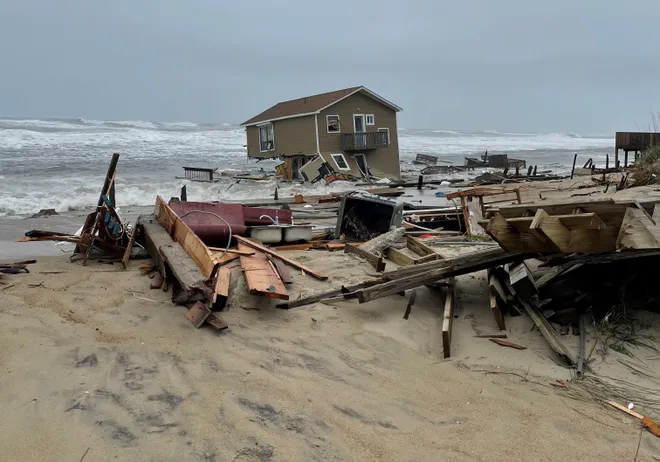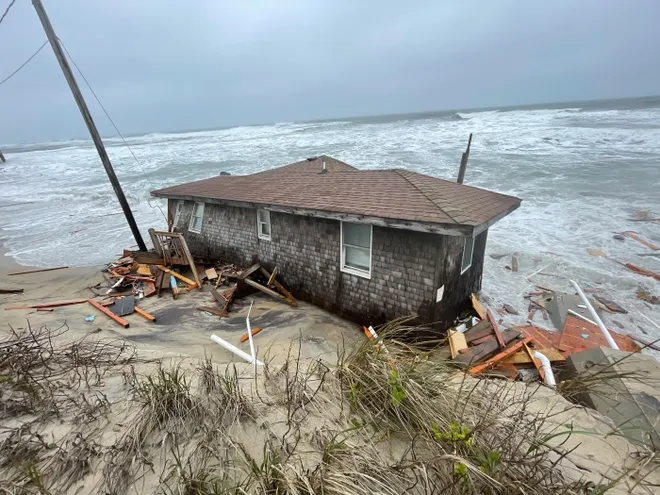Sixth Outer Banks house collapse since 2020: Photos capture damage as erosion threatens beachfront property
A house collapsed into the ocean on the Outer Banks of North Carolina early Tuesday morning, marking the sixth such incident on the area's beaches over the last four years.
The most recent collapse comes after a home in Rodanthe was swept away in March 2023 and two other houses fell in May 2022, among other incidents, as erosion takes its toll on the popular vacation area.
Cape Hatteras National Seashore announced in a news release Tuesday it has begun cleanup at the site of an unoccupied house that collapsed in Rodanthe, North Carolina. The agency said the house, located at 24131 Ocean Drive, likely collapsed around 2:30 a.m. local time Tuesday morning.

Authorities closed an approximately one-mile stretch of beach from Sea Haven Drive to South Shore Drive to help "ensure the safety of visitors and allow for cleanup activities to occur," according to the news release. Officials urged visitors to avoid the beaches north of Sea Haven Drive into the southern portion of Pea Island National Wildlife Refuge due to the direction the debris is expected to drift.
Outer Banks house collapse:Another Outer Banks house collapses into the ocean, the latest such incident along NC coast
Other recent house collapses in Rodanthe
May 2022: Two beach houses collapsed along North Carolina's coast and were taken under by powerful waves and high tides, the U.S. National Park Service said.
The two unoccupied homes – housed apart at 24265 and 24235 Ocean Drive – were in the Outer Banks community of Rodanthe, and no one was hurt. The park service closed the areas around the houses as debris from the homes spread.

"Unfortunately, there may be more houses that collapse onto Seashore beaches in the near future," David Hallac, superintendent of National Parks of Eastern North Carolina, said in a statement at the time.
"We proactively reached out to homeowners along Ocean Drive in Rodanthe after the first house collapse and recommended that actions be taken to prevent collapse and impacts to Cape Hatteras National Seashore."
March 2023:Another home in Rodanthe was swept away by the Atlantic Ocean. The oceanfront bungalow collapsed amid heavy surf conditions.
Officials warned at the time that with climate change raising sea levels and producing stronger hurricanes, the sight of oceanfront homes disappearing into the surf will likely increase in the coming years if swift action isn't taken.

Outer Banks home collapses since 2020
Here's a full list of the six privately-owned houses that have collapsed on Seashore beaches since 2020, courtesy of the National Park Service:
- May 29, 2020: An unoccupied house collapsed during the overnight hours at 23238 Sea Oats Drive, Rodanthe.
- February 9, 2022: On a calm winter day, an unoccupied house collapsed at 24183 Ocean Drive, Rodanthe.
- May 10, 2022: During a multi-day nor'easter, an unoccupied house collapsed at 24235 Ocean Drive, Rodanthe. The collapsed occurred during the early morning hours.
- May 10, 2022: During a multi-day nor'easter, an unoccupied house collapsed at 24265 Ocean Drive, Rodanthe. The collapse occurred during the early afternoon hours.
- March 13, 2023: During inclement weather, an unoccupied house collapsed at 23228 East Point Drive, Rodanthe.
- May 28, 2024: An unoccupied house collapsed around 2:30 a.m. at 24131 Ocean Drive, Rodanthe.
What is causing all of these houses to collapse in the Outer Banks?
According to the National Park Service, the daily effects of winds, waves and tides, along with rising seas (which is linked to climate change) and storms, have played a part in contributing to coastal erosion impacts at Cape Hatteras National Seashore, "particularly adjacent to the villages of Rodanthe and Buxton, North Carolina."
The effects of erosion in these villages have resulted in structures being present on the open beachfront or in the intertidal area, Cape Hatteras National Seashore officials said.
"During severe weather events, which the Outer Banks of North Carolina experiences throughout the year, privately-owned oceanfront houses in vulnerable areas get battered by strong winds and large waves," the NPS office's website notes.
Gabe Hauari is a national trending news reporter at USA TODAY. You can follow him on X @GabeHauari or email him at Gdhauari@gannett.com.
Disclaimer: The copyright of this article belongs to the original author. Reposting this article is solely for the purpose of information dissemination and does not constitute any investment advice. If there is any infringement, please contact us immediately. We will make corrections or deletions as necessary. Thank you.






